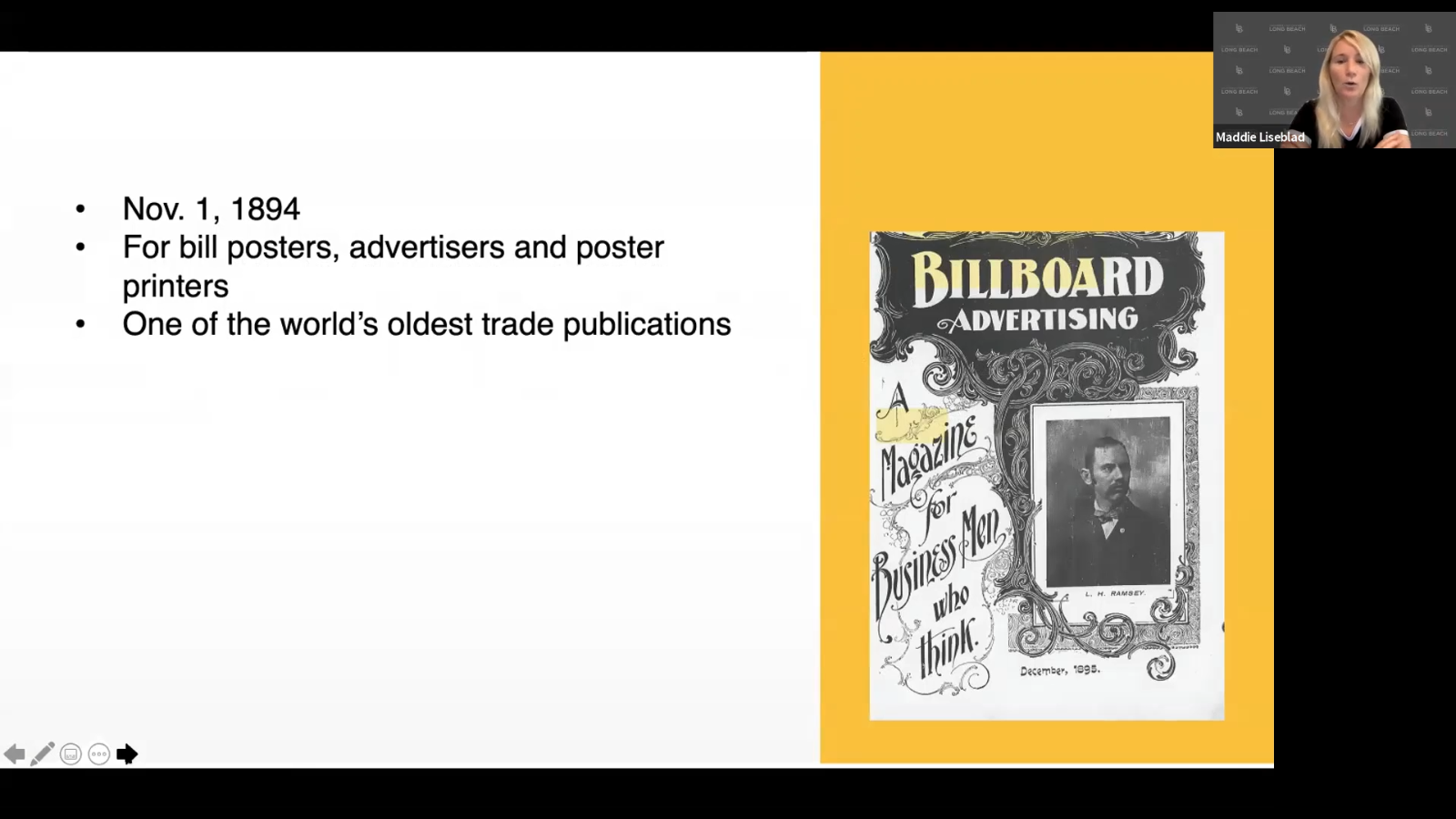 Madeleine Liseblad presents her co-authored research on Lee Zhito at the 2021 AJHA convention.
Madeleine Liseblad presents her co-authored research on Lee Zhito at the 2021 AJHA convention.
by Madeleine Liseblad, California State University, Long Beach
When Greg Pitts, my Billboard research co-author, dragged me into the Center for Popular Music to look at the Lee Zhito archival collection, I was lukewarm to the idea. I did not know anything about Billboard magazine, other than the name and that it covered the music industry. I had certainly never heard of Lee Zhito. But, it was an archive no one else had explored yet. Zhito had spent almost fifty years at Billboard and worked his way up to publisher and editor-in-chief. I figured there was probably something there to work with.
Fast forward to today. I am now a big Lee Zhito fan. By reading his writing and the correspondence in his files, you get a real sense of who he was. He was an excellent writer, seemed to be a great boss, had solid business skills, and knew how to network like no one else. His writing is incredibly colorful. He speaks in soundbites. In almost everything, there is a perfect quote waiting to be discovered.
For our first manuscript, Greg and I outlined Zhito’s career. It was presented at a national conference. We re-worked it based on reviewers’ comments and submitted it to a journal. I figured we would get a revise and resubmit. But, we did not. It was an outright reject. Thank you, but no thank you. I was devastated, but not for myself. I was devastated for Zhito because I felt his story was worthy of exposure. One of the reviewers commented we should have built the paper more around big events, such as how he exposed editorializing at radio station KMPC. I muttered to myself, yeah, of course that would have been nice. If only there were primary sources to tell that story.
As I was getting ready to leave Middle Tennessee State for a new position at Cal State Long Beach, I told Greg I wanted to review everything in the archive again. Since I was so green to the topic initially, I wanted to make sure I had not missed anything significant.
Box 7 folder 8 was labeled “Federal Communications Commission – 1951.” I haphazardly flipped through the pages of the FCC reports--I had seen them before--and found a letter from Ben Cottone, at one time the FCC legal counsel. The letter was addressed to “Dear Lee.” Interesting, I thought. I put folder 8 back in the box and took out folder 9. I casually started going through the items. I think I was halfway through the folder when I finally realized what a gold mine it was.
Zhito had not only saved everything related to KMPC, but he had also put items in a chronological timeline. He was 30 years old when he discovered the story. His prior writings focused on lighter, entertainment coverage. This was his big story. He was so afraid of libel, he taped stories, logged correspondence, and retained items he had gathered together in a big, long manuscript just waiting for me to unfold. As I read the items, following his intended trail of discovery, I could feel his excitement and fear. I read the back and forth correspondence with supervisors. It felt like I was there, listening in. I have never been so elated in an archive before.
The paper wrote itself. By far the hardest part was the literature review. I probably should not admit this, but the manuscript came together in less than a week. Part of it was that I was mesmerized by what I had. The primary source material was excellent. I was eager to see how Zhito framed his stories, how Billboard covered the topic, and what exactly transpired. The process of pulling it all together gave me some sort of natural high. I knew this was something special.
Generally, historical research is done in solitude. It is not a method that naturally lends itself to co-authors. But Greg and I balance each other well. He has a radio background so he knows things I do not. He added details to our paper that I had missed.
I would like to say I knew what I was doing when I went back to the archives. But, it was my stubbornness, and some luck, that led us here. I do not know how I initially missed it, but I did. We have now received a second chance to tell the world about this terrific journalist and Billboard leader. As Zhito would phrase it, he did not do “namby-pamby journalism.” His KMPC exposé had an immediate ripple effect with national ramifications.
Greg and I are obviously thrilled to have won the 2021 Wm. David Sloan Award for Outstanding Faculty Paper. But, the satisfaction goes well beyond the award. For me, it took us from a painful failure to sweet success. The quest to tell this story is personal because the world deserves to know about Lee Zhito and his impact. The KMPC story also reminds us that journalists and scholars have a responsibility to investigate and question media power and the potential abuse of that power. Good work, Lee Zhito!

